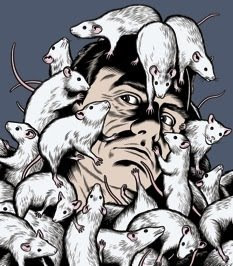> Knowing that T.C. Boyle’s fans won’t be happy with my comments, I have to say that this story did nothing for me. First of all, he should have called it “Rat Chow,” which you’ll understand if you read the story Second, is there anything about this story that isn’t predictable? Third, the voice of the narrator, Roger, is bland and uninteresting, and while I understand that the point of view was necessary to the telling of the story, I wish at least that Roger had been more relevant to it. (There is one saving aspect to the point of view that I’ll come back to.)
Knowing that T.C. Boyle’s fans won’t be happy with my comments, I have to say that this story did nothing for me. First of all, he should have called it “Rat Chow,” which you’ll understand if you read the story Second, is there anything about this story that isn’t predictable? Third, the voice of the narrator, Roger, is bland and uninteresting, and while I understand that the point of view was necessary to the telling of the story, I wish at least that Roger had been more relevant to it. (There is one saving aspect to the point of view that I’ll come back to.)
Roger is telling this story from some distance. It’s events have already taken place and he’s just telling the tale—to a newcomer in town or to a new acquaintance, or whatever. He knows the outcome, of course, but he doesn’t tell the listener, except that the listener probably knows what’s coming. The story is about Gerard, a widower who is letting himself go and who understands this. His effort to keep hold of reality is to get a pet python—not quite the dog or cat that his neighbors had hoped, but it’s something. When it comes time to feed the snake, Gerard ends up rescuing the rat that is supposed to be its supper. And the rat seems to be affectionate—how, we should ask ourselves, does Roger, the narrator, know any of this, particularly since it was happening while he was away for four months in Switzerland?—and so Gerard picks up some more rats. And they multiply. And the rest isn’t hard to imagine.
I said there was one saving grace to the point of view and that is that Roger appears to be moved by Gerard’s experience. He shows his wife that he loves her. He’s grateful for his dogs.
The only thing about this story that I liked is that Gerard, before he let the snake die, was considering naming him Siddhartha, or Jason, one or the other. What? And he named the first rat Robbie. After his brother. Hah!
Okay, I’m done. Did anyone like this story?
July 7 & 14, 2008: “Thirteen Hundred Rats” by T.C. Boyle

>No, I did not like this story. Boyle always produces yarns-with-a-twist. I don’t understand his decision to telegraph the climax of the story in advance. Kind of kills the suspense. I agree that the New Yorker doesn’t do much to introduce new authors and sticks to well-known names like Boyle.
>One giant eye roll on this one, and a big WTF thrown straight at The New Yorker. I just read this while, ahem, eating dinner. Half of my kabobs and humuus and pita went into the trash. It didn’t help that I have an ongoing war with rats, aggressive horrid rats making holes in my screen doors and window screens; screaming, squealing rats fucking their little rat wives all over my deck and multiplying like, well, rodents …
But I digress. Aside from all that, what was the point? And why did The New Yorker find this publishable? It’s an anecdote at best. We’ve rejected better work than this from the Night Train slushpile.
>Paul and Alicia: thank you. I do wonder what TNY was thinking on this one.
>I do not know why TNY continues to publish work by this author when there is so much other promising work and so many other deserving authors out there.
>I concur. I have no idea why TNY would publish something with such an obviously flawed narration.
>Lots of interesting criticism here of the New Yorker. As one of the few here who has never submitted a short story to a magazine (I’m a computer programmer), I would (perhaps naively) expect that several bloggers here have sent previous submissions to The New Yorker. If so, I’d be interested to hear about the experience. Cliff has blogged on the experience of receiving a rejection letter — a subject I found interesting. What are the New Yorker’s rejection letters like?
>Good question, Paul. TNY now takes email submissions, but the last time I bothered to submit there was 2006 so I don’t have a copy of my rejection. I do have a hardcopy rejection from 2004, though, and I don’t they’d be substantiall different. That says, “We regret that we are unable to use the enclosed material. Thank you for giving us the opportunity to consider it.”
>Did the catlady come to mind for anyone else?
Against popular opinion, I liked it. But it’s definitely a familiar story.